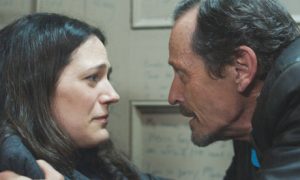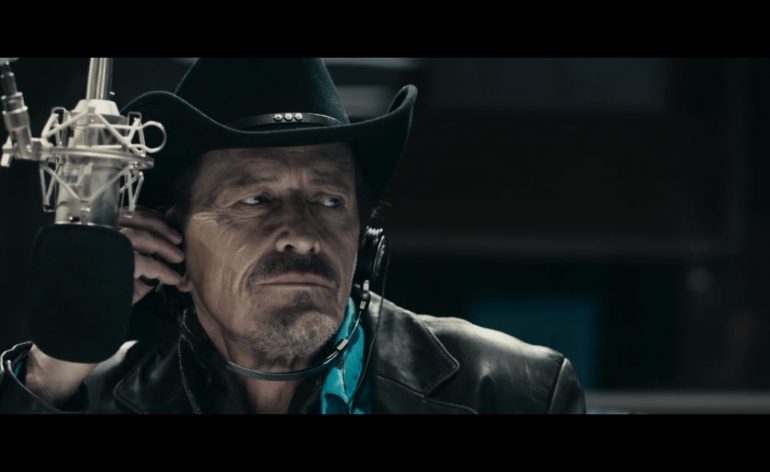Pontypool: Unspeakable Words
Small towns. Does anyone really like them, or are they just places to escape from? I grew up in a town of 9,000; it had one stoplight and the McDonald’s grand opening was a big deal. I couldn’t wait to get away.
But what if you have no choice but to go to a small town? That’s the predicament Grant Mazzy (Stephen McHattie) finds himself in. Once a popular shock jock, Mazzy is now consigned to the sleepy northern Ontario town of Pontypool. It’s the kind of place where the local community band gets prime airtime, everyone knows everyone, and the weatherman reports from his truck (with the aid of a sound effects tape to give the illusion that he’s riding the “Sunshine Chopper”).
 But all is not right in Pontypool. As Mazzy braves the winter storm on his way to work, he encounters a woman, who is mumbling in a strange language. Once he gets to work things only go downhill from there. Callers are increasingly speaking in tongues, riots are breaking out and the town gets quarantined over fears of a virus outbreak. Can Mazzy and his producer Sydney (Lisa Houle) stop fighting long enough to figure out what’s going on? (And more importantly, can they survive it?)
But all is not right in Pontypool. As Mazzy braves the winter storm on his way to work, he encounters a woman, who is mumbling in a strange language. Once he gets to work things only go downhill from there. Callers are increasingly speaking in tongues, riots are breaking out and the town gets quarantined over fears of a virus outbreak. Can Mazzy and his producer Sydney (Lisa Houle) stop fighting long enough to figure out what’s going on? (And more importantly, can they survive it?)
Filmed in 2008 and based on the book Pontypool Changes Everything by Canadian author Tony Burgess (who adapted the screenplay), Pontypool borrows its inspiration from Orson Welles’ radio adaptation of War of the Worlds (and reminded me a lot of the last episode of Clerks: the Animated Series, where Dante and Randall spend the entire day in the convenience store). Most of the action takes place within the confines of the radio station. This doesn’t mean the movie is boring, by any means. Director Bruce McDonald makes the most of his musical cues, ratcheting up the tension with every note. As Grant Mazzy, McHattie (who played Nite Owl Hollis Mason in Watchmen) nails the part of a world-weary radio guy who resents the position he finds himself in. It helps that McHattie has a voice made for radio; every breath seems calculated. Pontypool was simultaneously developed as a movie and a radio play, and it shows. This movie was made to be listened to alone, in a dark room, with a pair of canceling headphones. Props to the sound editing, who make every thump count and keep the tension tight throughout the film.
Pontypool both is and isn’t a zombie movie, so it avoids the trappings of “zombie fatigue” that plague other movies. The film spends its time on the unaffected, showing the monsters very sparingly. By devising its own in-universe explanation for how and why people become infected, Pontypool doesn’t trigger any cliche pitfalls. As a trope, zombies aren’t that interesting; they’re mindless and single-purposed. By focusing on the survivors, the film ends up being more character study with elements of horror. While there won’t be enough blood to satisfy torture-porn aficionados, Pontypool is recommended for anyone who enjoys a good, tense, slow burn thriller.
Pontypool tl;drs
Quick summary: Former shock jock Grant Mazzy is cooling his heels in the northern Ontario town of Pontypool. His routine morning show takes a turn; however, when strange things start happening to his listening audience.
Too many writers? Nope: Tony Burgess adapted his novel Pontypool Changes Everything for the feature.
Recommended if you like: War of the Worlds, single-room thrillers
Better than I expected? The intense way sound is used throughout the film.
Worse than I hoped? I’m gonna need the director to hurry up and release Pontypool 2, because that post-credits scene made no sense.
Should it be rebooted? The book the movie was based on was actually the second of a trilogy; it’d be interesting to see a miniseries based on the Pontypool trilogy on AMC or HBO.
Verdict: Turn down the lights and watch this one with a pair of headphones.
Related Reading: Wiki article






